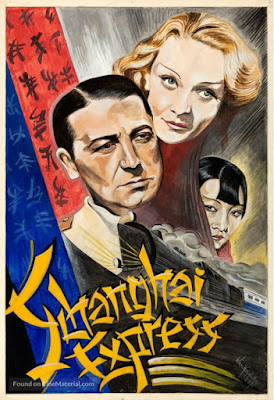Madeline may earn her cognomen but retains her fierce independence while Doc needs a prescription for his soulless lack of faith in her...and himself. Josef von Sternberg’s film worships at the alter of Marlene Dietrich, every composition by the legendary DPs Lee Garmes and James Wong Howe a masterclass in lighting her vivacious visage obscured by ghostly cigarette smoke and cloaked in shadow. Dietrich is often detached from the claustrophobic background in close-up as the camera (and viewer) adores her very essence, seeking her inner thoughts projected in her sultry gaze. Oh, and there is a story bout a train being hijacked and people taken prisoner on the way to Shanghai.
The story is dominated by von Sternberg’s direction and framing of every scene, the Form itself is greater than the tale he tells. His use of slow dissolve transitions as one scene doesn’t just establish time and place but actually becomes the next place, like a ghostly after-image. It’s an uncommon editing technique for it’s time and again, draws our attention to the physical Form of the medium as if we’re examining a museum painting of our lovely heroines. Madeline is know by her sobriquet Shanghai Lilly and rekindles her acquaintance with Doc who, by chance, is on the same train from Peking to the titular destination. Once lovers, he left her five years before and still carries her image in his wristwatch and she still carries his flame in her heart. But social hierarchies (he’s a Captain in the British Army and she’s a prostitute) are not healthy for such an amoral relationship. There is a Civil War raging in China and the train is stopped by the rebels who take Doc hostage. The boss is going to burn out Doc's eyes but Madeline trades her body for his eyesight by deciding to accompany the rebel leader to his palace. Anna May Wong as her cohort Hui Fei (I would argue even more beautiful than Dietrich!) stabs the rebel leader to death and they all escape back to Shanghai. And here’s the suspense as Madeline doesn’t tell Doc about her sacrifice; she leaves it as a matter of his faith in her. But he can’t seem to get over his jealousy, patriarchal conceit and rigid assumptions about his one-time lover and all seems to be lost. The film empowers Dietrich because she doesn’t beg for a forgiveness that isn’t needed, and she doesn’t tell Doc her secret: the moral conundrum is his, not hers.
Final Grade: (B+)

